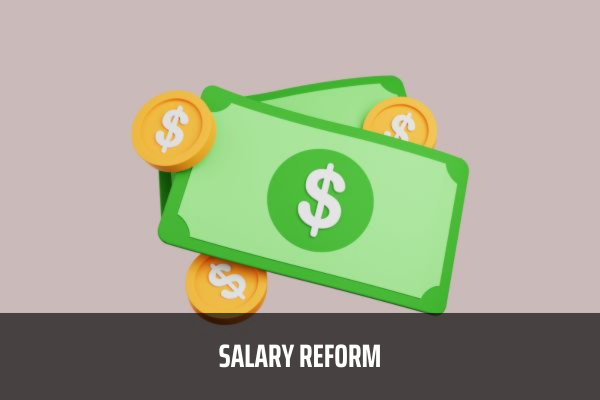Vietnam: How to formulate the bonus regime in the new payrolls in 2024 under the Resolution 27?
- Vietnam: How to formulate the bonus regime in the new payrolls in 2024 under the Resolution 27?
- How much will the salaries of officials and public employees increase after the 2024 salary reform in Vietnam?
- What are principles for formulating 02 new payrolls for officials after the 2024 salary reform in Vietnam?
Vietnam: How to formulate the bonus regime in the new payrolls in 2024 under the Resolution 27?
Pursuant to Resolution 104/2023/QH15 on state budget estimates for 2024, there is a regulation that from July 1, 2024, implement overall salary policy reform according to Resolution 27-NQ/TW of 2018.
Pursuant to Resolution 27-NQ/TW of 2018, the new payrolls according to job position and salary reform 2024 includes the following payrolls:
Payroll 1:
Payroll applicable to leadership positions (elected and appointed) in the political system from the central to commune levels.
Payroll 2:
Payroll applicable to professional and technical positions based on officials' ranks and public employees' professional titles, applicable to officials and public employees without leadership positions. Each officials' rank and public employees' professional title will have multiple pay steps.
Payroll 3:
Payroll applicable to military officers, police officers, and non-commissioned officers (based on ranks or grades and positions or titles).
Payroll 4:
Payroll applicable to professional servicemen and technical professionals in the police force.
Payroll 5:
Payroll applicable to defense workers and police officers (with a salary relationship to administrative officials as it is currently).
Resolution 27-NQ/TW of 2018 has established these new payrolls based on a new structure, including:
Base pay: accounting for about 70% of the total salary fund.
Allowances: accounting for about 30% of the total salary fund.
Bonuses: the bonus fund will be about 10% of the total annual salary fund, excluding allowances.
The new salary reform in 2024 includes the position-based payroll in which the bonus amount is an additional component in the new salary structure based on ensuring a bonus fund of around 10% of the total salary fund for the year, excluding allowances.

Vietnam: How to formulate the bonus regime in the new payrolls in 2024 under the Resolution 27?
How much will the salaries of officials and public employees increase after the 2024 salary reform in Vietnam?
According to the Government's Electronic Portal, the Minister of the Ministry of Home Affairs stated that under the salary reform plan, starting from July 1st, the average salary of officials and public employees is expected to increase by approximately 30% (including base pay and allowances).
Another notable point is that from 2025 onwards, the Government will continue to adjust the salary levels in the payrolls with an average additional increase of about 7% per year. This means that after implementing the salary reform and having new payrolls with higher salary levels than the current ones, officials and public employees will still receive an additional annual salary increase of 7%.
Therefore, with the implementation of the 2024 salary reform, the average salary for officials and public employees is expected to increase by around 30% (including base pay and allowances). From 2025 onwards, the Government will continue to adjust the salary levels in the payrolls with an average additional increase of about 7% per year. This means that after implementing the salary reform and having new payrolls with higher salary levels than the current ones, officials and public employees will still receive an additional annual salary increase of 7%
What are principles for formulating 02 new payrolls for officials after the 2024 salary reform in Vietnam?
Principles for formulating payroll 1:
Pursuant to Resolution 27-NQ/TW of 2018, it was agreed to formulate a position-based payroll applicable to officials holding leadership positions (elected and appointed) in the political system from the central to the commune level, based on the following principles:
+ The salary level must reflect the hierarchy within the political system; those holding leadership positions will receive salaries based on their respective positions. If a person holds multiple positions, they will receive the highest salary level. Those holding equivalent leadership positions will receive the same salary level. The salary level of higher-level leaders must be higher than that of lower-level leaders.
+ A fixed salary level is determined for each type of equivalent position; there is no classification of ministries, sectors, departments, committees, and equivalent units at the central level when constructing the position-based payroll at the central level. Different salary levels for the same leadership position based on the classification of administrative units at the local level will be implemented through allowances.
+ The classification of equivalent leadership positions within the political system for designing the position-based payroll will be decided by the Politburo after reporting to the Central Executive Committee.
Principles for formulating payroll 2:
Pursuant to Resolution 27-NQ/TW of 2018, it was agreed to formulte a professional and vocational-based payroll applicable to officials without leadership positions, based on their ranks. Each rank will have multiple salary levels based on the following principles:
+ For the same level of job complexity, the salary level will be the same. Higher labor conditions and occupational benefits will be implemented through vocational allowances. The classification of job groups and number of levels within officials' ranks and public employees' professional titles will be rearranged to encourage officials and public employees to improve their professional and vocational qualifications.
+ Appointment to officials' ranks or public employees' professional titles must be associated with the job position and the structure of officials' ranks and public employees' professional titles implemented by the managing agencies and organizations responsible for officials and public employees.
LawNet